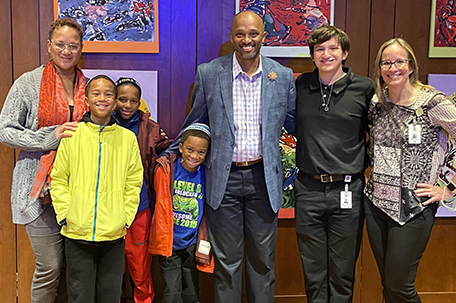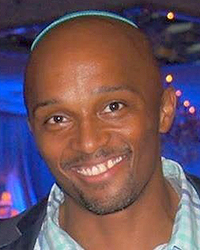
ABOVE PHOTO: Chai Respes, his wife and children; and Meredith Becker, CEO of the Lions Gate Life Plan Community in Voorhees and her son Sam. (Photos : Kris Parsons of Parsons PR.)
Most people don’t know that America’s Black religious history includes Judaism. Chai Respes is hoping to change that.
By Denise Clay-Murray
Before he was sent to the Dallas Mavericks at the NBA trade deadline, Brooklyn Nets point guard Kyrie Irving attracted a group of somewhat controversial fans to the Barclay Center.
The group of fans, a religious sect called the Hebrew Israelites, came to protest Irving’s suspension from the team for co-signing on a documentary called “Hebrews To Negroes: Wake Up Black America.” For a lot of his fans, Irving’s apparent agreement with a video that many see as antisemitic was a hard pill to swallow.
It was especially hard for folks like Chai Respes because he now had to reconcile his fandom of Duke University basketball in general, and of Irving in particular, with his Judaism.
It wasn’t easy, especially since racist and/or antisemitic incidents guarantee he gets questioned by both sides.
“I joke that I am a walking unicorn because I do live in two worlds,” he said. “For my African American peers and friends, a lot of times the questions are, ‘Well, how come we’re not hearing about this from the Jewish community when [racist incidents] are happening? Why is the sound so muted if we do hear anything? And where is the Jewish community at on this topic and on that topic that [is] impacting us?’ It is, ‘Well, what’s your perspective as a Black Jewish person? Is your black side talking? Or is your Jewish side talking?’”
“I can’t separate who I am,” Respes continued. “It’s not like you turn on an ‘on-and-off’ switch on being African American or being a Jew. This is just who I am.”
In the early 1950s, the Adat Beyt Moshe Congregation called Philadelphia home. Respes’s grandfather, the late Abel Respes, was the founder of that congregation, which later moved to Elwood, New Jersey. He was one of the earlier rabbis of color in Philadelphia and his uncle, Gamliel Respes, was also a rabbi.

Like his grandfather and uncle before him, Chai Respes has been using his experiences as a Jew of color to bring awareness of the challenges faced when you’re a member of two traditionally marginalized communities. He’s a founding member of Achim Sheli: My Brothers and Sisters, a group at Congregation Beth El in Voorhees, New Jersey, that celebrates ethnic and cultural diversity. In addition to being a member of Congregation Beth El, and Kahal Kadosh Mikveh Israel in Philadelphia, Respes is a rabbinical student at the Rabbinical Seminary International. He has also delivered a talk for Black History Month at the Lions Gate Life Plan Community in Voorhees, New Jersey.
The SUN spoke with Respes about antisemitism, the relationship between the Black and Jewish communities, and why he can give Kanye West more of a pass than he can Kyrie Irving.
SUN: I thank you for taking the time to talk with me because, and I have to be honest, when I told people that I was interviewing you, the first question that came out of almost everyone’s mouths was “There are Black Jews?” For many of us, the only Black Jew we know of is the late Sammy Davis Jr. We don’t necessarily see ourselves in the Jewish community. In fact, despite all the history that should show otherwise, there’s a mistrust. Why do you think that is?
CR: Sadly, there is a common misconception that the only way that you can be an African American Jew is if you converted. And one of the issues that people of color, regardless of whether they’re African American, they’re Hispanic,[or] they’re Indian, in trying to find a safe community to try and practice their religious beliefs is that need to question their authenticity. There have been Jews of color throughout history. And the sad part is that leads partially to some of the disconnect that is currently existing between the Caucasian European Jewish community and the African American community because when a Jew of color walks into one of the Sacred Spaces, and they don’t feel as if they’re there as a full-fledged member because someone is judging how they entered or how they came to be, it makes what should be a safe space, a place of antagonism, a place of defensiveness, a place of unease. So, while yes, we may appear as unicorns, we’re no mythical creatures.
SUN: During the Civil Rights Movement, the Black and Jewish communities worked in tandem. In fact, they worked together so closely that they co-founded the NAACP. But now, there seems to be a competition between the two groups.
CR: You’re hitting the nail on the head. I personally believe that it is a combination of a number of things from the African American community. It is a sense of education. From the Caucasian community, it is a sense of inclusivity, right? So, for Caucasian Jews, man, you’ve hit the jackpot — you’ve assimilated into the mainstream culture. But that wasn’t the case, necessarily. Early on, when Caucasian Jews fled from persecution in Europe, they came to this country to have to change their names. So, they understood and they knew firsthand the plight of African Americans of what they were going through here in the states. And as time evolved, Caucasian Jews were able to assimilate easier into mainstream American culture, getting into the golf course clubs that they weren’t able to get into [and] having access to the jobs they weren’t able to have access to initially.
And after some of those initial efforts, in the early 60s, both groups and other groups — it’s a never-ending cycle — have resorted into tribalism, right? So, when things start to get a little murky, I’m going to go back to who I know. I’m going to stick with my group, my tribe, that’s where I feel safest at. And it’s because of that fear, that there’s been a lack of each side reaching out and consuming that dialogue, and continuing to engage with each other, so that in the next round of kids that grew up, right, there weren’t as many Ephraims and Joshuas in the class with little Malcolm and little Abe, right, who were African American. So now you go another generation behind.
When times get difficult, when things aren’t going our way, when we are feeling right or wrong, perception or reality, that we are being attacked, it’s easy to allow ourselves to, again, revert back into that tribal mindset and say, ‘Well, no, that’s your problem over there. That’s not my problem. Because we’re not creating those spaces where people are meeting each other, talking to each other, engaging with each other.
SUN: One of the most recent occasions where these conflicts became a thing was when rapper Kanye West had that moment when he praised Adolf Hitler and NBA basketball player Kyrie Irving embraced a documentary with antisemitic overtones. You said earlier in this conversation that you can’t split yourself between your Black and Jewish selves. Did you feel pressured to respond from both sides?
CR: Yes, I did. When I talk to my Caucasian Jewish peers, they’re sometimes astonished by that and they’re like, ‘Wait, you get questions from the African American community as well?’ They want to know what my perception is.
I look at what [Irving] did very differently than what Kanye did. For Kanye, and I don’t know him at all personally — and maybe it’s because I also lost my mother just a few short years ago — he seems as if he’s having a very difficult time with his emotional and mental well-being. And the stuff that he’s put out just in general, like, you know, meeting with Donald Trump and running for president, just seem to be from a place of a person who is not mentally and emotionally well.
Kyrie, however, was very different. What Kyrie did to me was blatant antisemitism, because Kyrie isn’t coming from a place where he didn’t interact with Jewish people. Kyrie’s not coming from a place of a lack of education, or knowledge that Jewish people don’t run the media and run the world. These are very old stale tropes of hate. And that was very, very problematic, and hurtful for me. It was hurtful as a Jew, hurtful as an African American, hurtful as a fan of Duke basketball, and up until that point, a fan of Kyrie Irving. And when those instances do arise, I do feel a responsibility to try and be that bridge between the two groups, to initiate conversations and keep conversations that are happening in silos and [try to] to create opportunities [where] people will come out of their own places of fear and apprehension and say, ‘Okay, I’m willing to have a conversation with someone who I think is an ‘other.’

















Leave a Comment